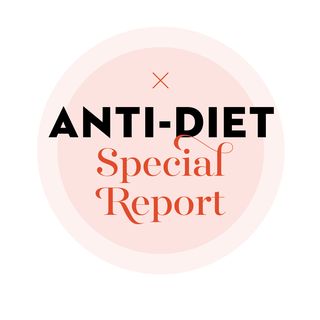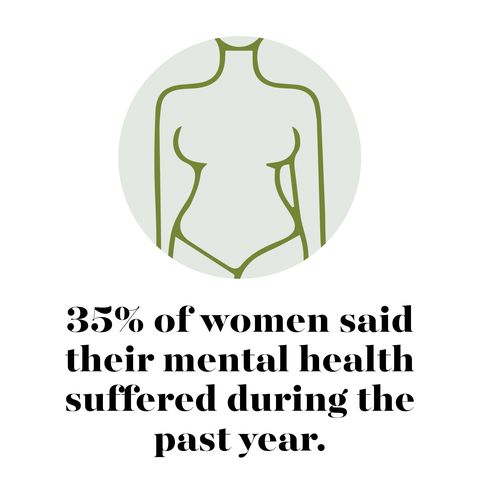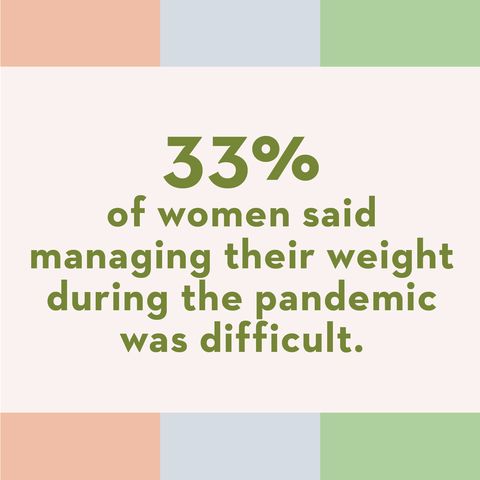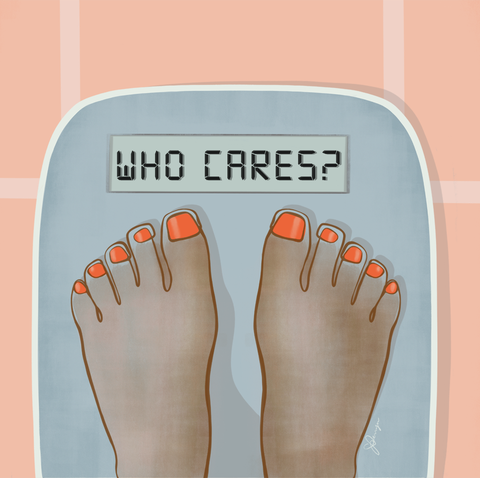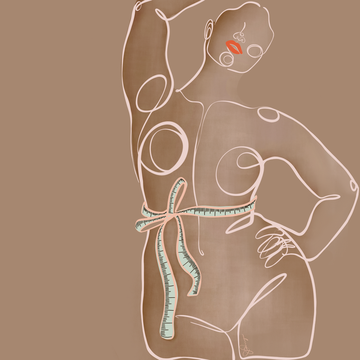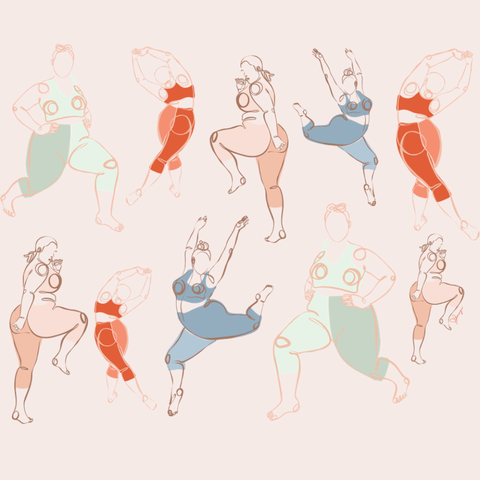Why You Shouldn’t Obsess Over Your Quarantine Weight Gain
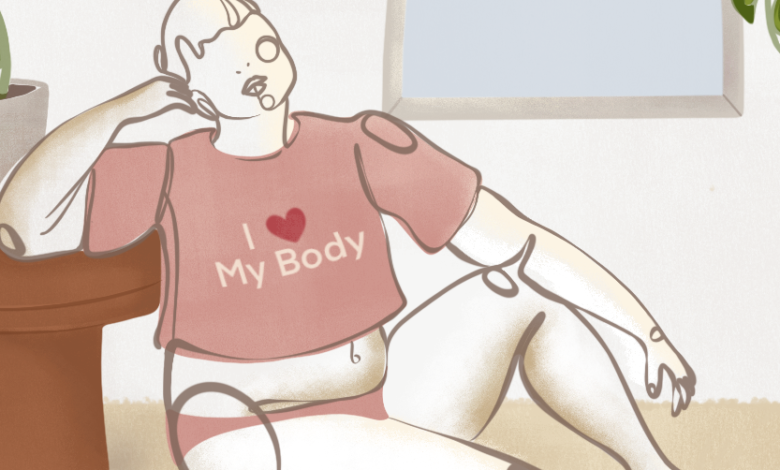
[ad_1]
Like most people during lockdown life, I’ve leveled up my loungewear game. I’ve got three or four pairs of very beloved sweatpants that I now live in, since we go absolutely nowhere. I like that they fit where my body is now, after over a year of pandemic life. And as I write this just a week out from getting my second COVID-19 vaccine, I’ve already decided: When it’s safe to re-enter the world, my sweatpants are coming with me. Because I’m not planning to get my “pre-pandemic body” back. And you don’t have to either.
No, really. You don’t.
It’s not surprising that almost as soon as the pandemic began, we saw folks bragging on social media that they were going to use quarantine to “get in shape.” And now that vaccination has begun and we’re seeing #gotmyshot selfies, our cultural conversation around weight gained while we were at home more became even more frenzied, with estimates of how many pounds we’ve put on, and (as always) unsolicited advice from friends, articles and advertisements on the best way to lose it. Diet culture has programmed us to scrutinize our bodies during every major life change, whether that’s going to college (don’t gain the freshmen fifteen!), getting married (there will be heirloom photos!), having a baby (look like you never grew a human as quickly as possible, please!) or when hormones shift in menopause (avoid the dreaded “meno-pot!”).
COVID is a collective trauma
And just so we’re clear: Surviving a global pandemic is also a major life event, not a weirdly extended staycation — especially not for first responders, grocery store clerks and other essential workers. Most of us have spent the past year in a state of near-perpetual anxiety and stress. Over 30 million of us have gotten the virus. Twelve million of us have fallen behind on the rent and another 10 million on mortgage payments due to COVID-related job losses, according to the Center for Budget and Policy Priorities, which also reports that 22 million American households say they did not have enough to eat in the past week. And let’s not forget that over 550,000 Americans have died from the virus — including, maybe, someone you loved dearly.
But by all means, let’s make sure to re-enter the world looking better than we left it.
It makes perfect sense that so many of us obsess about body size when we’re stressed, anxious or struggling — but that’s diet culture talking, convincing you that you should feel bad about your body on top of everything else you’ve got going on. Bodies have changed; my pre-pandemic jeans have gotten tighter, just like my pre-baby jeans did before them. Maybe some people ended up with a lot of free time they could spend hiking or working out in the safety of their own home gyms. But most of us, especially working parents left scrambling for childcare, have had far less free time than we did before, and certainly, fewer options for exercise.
Eating habits have also shifted; at first because we were afraid to go to the grocery store, and then because cooking every meal is exhausting and takeout is easier, or because comfort eating is one of the few coping strategies available right now. Or maybe financial straits have limited your food choices and eating what you could afford has led to a few extra pounds.
Pandemic weight gain makes perfect sense
Disordered eating behaviors have jumped during the pandemic, for all kinds of reasons. It’s easy to get down on yourself for exercising less and stress eating more, especially if your old clothes aren’t fitting so well. But having something comforting to eat is a valid coping strategy when you’re going through any kind of trauma. And our discomfort with it all is really about our culture’s underlying fatphobia, says Amee Severson, R.D., a registered dietitian in Bellingham, WA who specializes in eating disorder treatment. “We wouldn’t be afraid of emotional eating if we weren’t afraid of weight gain,” she says.
In fact, fear of weight gain often drives our eating behavior; research shows that dieting or otherwise restricting our food intake is one of the most common precursors to binge eating. We tell ourselves we aren’t going to “overeat” and then we skip meals or skimp on portions all day, only to wind up starving and inhaling every cookie in the house after the kids go to bed. Then we blame the binge on our supposed lack of willpower instead of recognizing that initial restriction period as the culprit.
Diet culture likes to convince us that coping well with a hard situation should look like finding time for rigorous workouts and only eating salad every day. But coping well might just mean finding time to cry in your car so you don’t scream at your kids or checking out for a bit every night with some chocolate and reruns of Veronica Mars.
It’s time to be gentle with yourself
Imagine, for a second, if you didn’t judge yourself and your body so harshly for changing during this time. You can then start to reframe your understanding of the way your lifestyle has changed and find compassion for these choices.
Instead of “I’m so bad for eating all this ice cream,” you might think, “This ice cream is delicious and it’s so nice to have a treat after another long day in lockdown.” Instead of, “It’s been a year since I set foot in the gym,” maybe it’s, “I’m glad we got the pandemic puppy so I get outside for a walk every day.” Or even, “I’m glad I’m getting more rest this year because wow, this is exhausting.“
“Anything you needed to do to survive this pandemic was ‘good for your health,’” says Rachel Millner, Psy.D., an eating disorder therapist in private practice in Doylestown, PA. Showing resilience doesn’t mean we’re always flourishing, and it doesn’t have anything to do with body size. “So many of us have had to show up for work, for kids, for our partners and ourselves in ways we never thought we would have to. Resilience is when you do that imperfectly and just keep doing it,” says Dr. Millner. “Some days just getting out of bed and taking a shower is resilient. Logging onto a Zoom meeting is resilient. And in a world that’s constantly telling us we aren’t good enough, nice enough or thin enough, just giving yourself permission to be your imperfect self takes a ton of resilience.”
In other words, you deserve a giant prize just for existing right now.
Being healthy and being thinner aren’t the same thing
Now I know what you’re thinking: But what about health? Even if I make peace with the aesthetic of my bigger body, don’t I need to lose this weight to get healthy again? And here, the very clear and research-based answer is: No.
If there’s a medical reason you’ve put on weight, you are better off treating the underlying issue than trying to solve it through weight loss. And if you haven’t been able to exercise or eat as healthily because of the pandemic, you can focus on gently shifting your lifestyle back without worrying about whether that changes your weight. A large body of research shows when it comes to mortality risk, your cardiorespiratory fitness matters more than your weight, which is why any given person can be larger-bodied and fit, or smaller-bodied and unhealthy.
And lifestyle habits in general appear to be a better predictor of health than weight, according to a 2012 analysis of data from the CDC’s National Health and Nutrition Examination Surveys. These researchers found that regardless of weight class, people lived longer when they practiced healthy habits like not smoking, drinking alcohol in moderation, eating five or more servings of fruits and vegetables daily and exercising 12 or more times per month. I know you may not have been adhering to all of that over the past year, but you’ll have an easier time bringing back a healthy habit or two when you aren’t measuring your success by your ability to fit in your pre-pandemic jeans.
We’re all anxious about re-entering society
Hopefully you’re able to cut yourself some slack for the extra comfort eating and missed workouts. But you may still feel anxiety about presenting a changed body to the world, as lockdown restrictions lift, vaccine rates increase, and we’re (hopefully) able to do and be more places in the upcoming months. Will everyone notice if you’re bigger or rounder than the last time they saw you? (Odds are they’re going to be far too busy worrying what you think of them.) “Try to find gratitude that your body has gotten you through this traumatic time, even while you recognize that weight stigma makes body changes hard to navigate,” says Dr. Millner.
When you find yourself fixating on how you look, try to verbalize what else you’re really worried about, she advises. Sure, thinking that everyone is noticing your midsection might be part of it, but maybe it’s also that you’re finding social interactions more exhausting than you used to, or you’re still worried about how to navigate COVID safety protocols with people who may have a different risk tolerance than you. Or maybe you’re just overwhelmed from all you’ve been through! Remember that you would have all those same feelings even if you were thinner and then give yourself some grace. Getting back to “normal” (whatever that even means now) is something we’re all going to need to practice.
Whether you’re feeling ready to rejoin the world or hoping to stay in hiding a little bit longer, here’s what I know: Everyone still standing right now has survived a life-changing amount of collective trauma. We are all different than we were 13 months ago; we will never again be our pre-pandemic selves. And so it makes sense that our bodies are different too. Bodies aren’t meant to remain the same throughout our lives. We can and should mourn what we’ve lost. But we should also celebrate, or at least find peace with, what we’ve gained.
This content is created and maintained by a third party, and imported onto this page to help users provide their email addresses. You may be able to find more information about this and similar content at piano.io
[ad_2]
Source link


